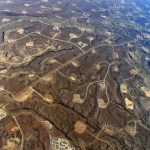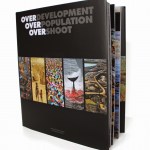Yesterday was a great day for comparative physiology!
Highlights from the seminars on comparative physiology:
Melissa Reiterer, graduate student from Florida Atlantic University, presented her research on how freshwater turtles (Trachemys scripta) survive for long periods of time without oxygen and do not develop oxidative stress after oxygen is restored. The turtles are able to do this by creating their own antioxidants as well as eliminating oxidative stress. In contrast, mammals including humans, develop quite a bit of oxidative stress following a stroke as…
pollution
A few of the recent pieces I recommend reading:
Sarah Kliff & Ezra Klein at Vox: The Lessons of Obamacare
Chris Ladd in Forbes: Unspeakable Realities Block Universal Health Coverage in the US
Donelle Eller in the Des Moines Register: Iowa pollution enforcement could lose big under Trump EPA cuts, critics warn
Teddy Wilson at Rewire: Texas Legislators "Ignore" Spiking Black Maternal Mortality Rates
Linda-Gail Bekker & Anthony S. Fauci at STAT: Women are Leading the Way in HIV Research
And because the House Republicans' healthcare bill is so consequential for public health and there's…
Today is about American tradition, and feeling grateful for all that we have been given. The first Thanksgiving represented the gratitude of American settlers towards the indigenous peoples who originally inhabited this country. It is about the men and women who came to North America on the Mayflower giving back to the men and women who helped them to survive in the 'new' world. It is about Tisquantum, a Patuxet enslaved by a Briton, sold in Spain, liberated by monks, and steeped in the English language before returning to his homeland and teaching the colonists to "catch eel and grow corn."…
Research makes it increasingly clear that along with drilling for oil and mining coal, extracting natural gas from deep underground causes serious damage to the environment and to public health. On The Pump Handle, Kim Krisberg examines the contamination that may result from dumping fracking wastewater into disposal wells, writing "about 1,000 different chemicals are used in the fracking industry, with more than 100 being known or suspected endocrine disruptors." Researchers collected water samples downstream from wells in West Virginia, and after "exposing both female and male mammalian sex…
August 13th was Earth Overshoot Day. The correct date, if calculated precisely, would come earlier and earlier each year, the current choice is just an approximation.
This year, the year 2015, by sometime around August 13th, humanity had consumed as much of what we require from the lands and seas as our planet can sustainabley provide in an entire year. That is another way of expressing the fact that at current consumption rates, humanity requires 1.6 planet earth's worth of fruits and vegetables, meat, fish, wood and other organic materials. It is a remarkable annual deficit, and if it is…
Frog with an extra foot. Image from the Minnesota Pollution Control Agency.
Image of a frog with a missing leg from the Minnesota Pollution Control Agency.
Since 1995 deformed frogs have been turning up. Call them the canaries in the coal mine for environmental health. Frogs are showing signs of some kind of stress.
So is it a parasite? Pollution? A natural phenomenon? Cannibalism? Fungus? Ultraviolet light? Something in the water?
Video from YouTube
The tap water data referred to in the video in which they placed embryos in tap water collected from different sites in Minnesota…
Life has been growing on Earth for about 4 billion years, and during that time there have been a handful of mass extinctions that have wiped out a large percentage of complex lifeforms. Asteroid impact, volcanic eruption, climate change, anoxia, and poison have dispatched untold numbers of once-successful species to total oblivion or a few lucky fossils. Species also die off regularly for much less spectacular reasons, and altogether about 98% of documented species no longer exist.
Cry me a river, you say, without all that death there would have been no gap for vertebrates, for…
A few of the recent pieces I've liked:
The Latest in the NPR-WAMU series Poisoned Places: Elizabeth Shogren and Robert Bennicasa on "Baton Rouge's Corroded, Overpolluting Neighbor: ExxonMobil"and Richard Harris on "Breathing Easier: How Houston is Working to Clean up its Air."
Maryn McKenna at Superbug: To Prevent MRSA In Hospitals, Don’t Prevent Only MRSA
Matthew Yglesias at Slate: The Best and Simplest Way to Fight Global Poverty
Eric Jankiewicz and Sara Sugar of Brooklyn Bureau: Bushwick's Struggles With Asthma: What's Poverty's Role?
Tracy Weber, Charles Ornstein, and Jennifer LaFleur of…
Coal-fired electricity production is bad on so many levels.
You'd think humans could learn from history, but sadly, no, and no. The childhood asthma statistics alone should be enough. Coal burning power plants are a leading producer of asthma causing pollution. And then there's the mercury...and the mountain-top removal, and the waste products..and, well, when do we say "enough"?
by Elizabeth Grossman
The good news is that in 2011 there were 53 fewer reported refinery accidents in Louisiana than there were in 2010. The bad news is that the 301 refinery accidents reported to the state in 2011 released nearly 50,000 pounds more air pollutants and nearly 1 million gallons more contaminants to soil and water than did the 354 accidents reported in 2010 – this according to a new report released Monday by the Louisiana Bucket Brigade and United Steelworkers. “Our aim is to collaborate with the refineries to solve the problem. Unfortunately that day hasn’t come yet,” said…
Earlier this week, the EPA released a report that quantifies costs and benefits of the 1990 Clean Air Act Amendments - and, surprise, surprise, the benefits substantially outweigh the costs: $2 trillion vs. $65 billion in 2020.
Specifically, The Benefits and Costs of the Clean Air Act from 1990 to 2020 evaluates the costs and benefits of programs implemented pursuant to the 1990 Clean Air Act Amendments, comparing today's outcomes with what would've been expected had control programs remained only as stringent as they were before the 1990 changes took effect. The figures cover not only the…
tags: The Oil Spill's Unseen Culprits, Victims, health, environment, ecology, pollution, oilspill, BP, acidification, Gulf of Mexico, dispersants, Carl Safina, TEDTalks, TED Talks, streaming video
The Gulf oil spill dwarfs comprehension, but we know this much: it's bad. Carl Safina scrapes out the facts in this blood-boiling cross-examination, arguing that the consequences will stretch far beyond the Gulf -- and many so-called solutions are making the situation worse.
TEDTalks is a daily video podcast of the best talks and performances from the TED Conference, where the world's leading…
tags: Following The Mercury Trail, health, environment, ecology, pollution, PCBs, DDT, heavy metals, red tide, human sewage pollution, Stephen Palumbi, TEDTalks, TED Talks, streaming video
There's a tight and surprising link between the ocean's health and ours, says marine biologist Stephen Palumbi. He shows how toxins at the bottom of the ocean food chain find their way into our bodies, with a shocking story of toxic contamination from a Japanese fish market. His work points a way forward for saving the oceans' health -- and humanity's.
TEDTalks is a daily video podcast of the best talks…
tags: Care for Some Crude With Your Sushi?, toro sushi, maguro sushi, Atlantic Bluefin Tuna, Thunnus thynnus, Gulf of Mexico, pollution, oil spill, Deepwater Horizon, BP, British Petroleum, overfishing, endangered species, conservation, marine biology, streaming video
The Gulf of Mexico oil spill is the worst environmental disaster the US has faced. Toxic oil from the Deepwater Horizon well threatens the region's sensitive shorelines and the nesting birds along the Louisiana coast. But there's another species at serious risk: the Atlantic bluefin tuna, Thunnus thynnus. This disturbing video…
This seems to have become unofficial volcano week, here at ScienceBlogs. If you haven't been following the coverage of the Eyjafjallajökull eruption at Erik Klemetti's Eruptions blog, you should consider doing so. Also, Dr. Isis has a post on how the eruption has fouled up all nuclear imaging plans at her place of research, and Ethan explains how volcanic lightening works.
Our benevolent overlords have further commented: "Eyjafjallajökull's ill temper has been an unexpected object lesson in the complexity and interconnectedness of our environment, technology, and social networks." To that I…
tags: Story of Stuff, environment, pollution, climate change, global warming, recycling, social commentary, cultural observation, planned obsolescence, perceived obsolescence, fashion, advertizing, social psychology, streaming video
From its extraction through sale, use and disposal, all the stuff in our lives affects communities at home and abroad, yet most of this is hidden from view. The Story of Stuff is a 20-minute, fast-paced, fact-filled look at the underside of our production and consumption patterns. The Story of Stuff exposes the connections between a huge number of environmental…
tags: conservation, reptiles, King Cobra, Ophiophagus hannah, Gharial, Gavialis gangeticus, water pollution, Romulus+Whitaker, TEDTalks, streaming video
The gharial, Gavialis gangeticus, and king cobra, Ophiophagus hannah, are two of India's most iconic reptiles, and they're endangered because of polluted waterways. Conservationist Romulus Whitaker shows rare footage of these magnificent animals and urges us to save the rivers that sustain their lives and our own.
TEDTalks is a daily video podcast of the best talks and performances from the TED Conference, where the world's leading thinkers…
tags: Project Kaisei, Oceanography, North Pacific Gyre, North Pacific Garbage Patch, plastic, pollution, environment, streaming video
Underwater videographer, underwater photographer, and author, Annie Crawley joined Scripps Institute of Oceanography and Project Kaisei aboard the New Horizon on a 3 week long expedition to the North Pacific Gyre. They collected data to help find a solution to the "Plastic Vortex" forming in our Ocean.
tags: Project Kaisei, Oceanography, North Pacific Gyre, North Pacific Garbage Patch, plastic, pollution, environment, streaming video
Project Kaisei's 2009 Expedition. Footage from the Kaisei, one of two research vessels Project Kaisei sent to the North Pacific Gyre in August, 2009 to study the extent of the marine debris problem in the gyre, the impact it may be having on marine life and the food chain, and to find ways to catch and recover some of the debris for a larger clean-up effort.
tags: FLOW, For the Love of Water, pollution, bottled water, film trailer, streaming video
Part eight (the last part) of Irena Salina's award-winning documentary investigation into what experts label the most important political and environmental issue of the 21st Century: The World Water Crisis.
Learn more about the film and purchase the DVD.






